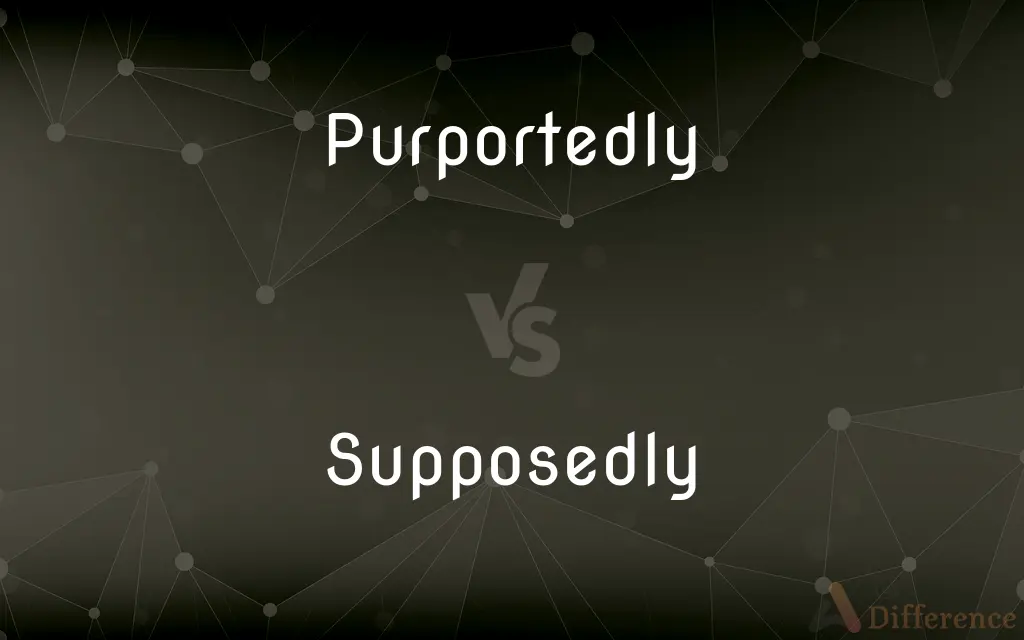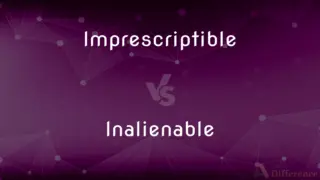Purportedly vs. Supposedly — What's the Difference?
Edited by Tayyaba Rehman — By Urooj Arif — Updated on April 23, 2024
Purportedly refers to something claimed to be true or to have happened, often without proof, while supposedly suggests something is assumed or believed to be the case, with a tone of doubt or skepticism.

Difference Between Purportedly and Supposedly
Table of Contents
ADVERTISEMENT
Key Differences
Purportedly is used when an assertion is made about something, indicating that it is presented as true, regardless of whether it has been verified. This term often carries the implication that the information may not be backed by solid evidence. Whereas, supposedly introduces the idea that something is commonly accepted or believed to be true, but there is an underlying tone of skepticism or uncertainty about the actual truth of the matter.
The use of purportedly in a statement often signals that the speaker is relaying information that has been claimed by someone else, without taking a stance on its accuracy. This can be useful in journalistic or formal contexts where neutrality is essential. On the other hand, supposedly can imply that the speaker is more doubtful about the veracity of the claim, even if it is widely believed or accepted by others.
Purportedly leans more towards conveying that something is alleged or claimed, often by a specific source or party. It’s used when the emphasis is on the claim itself rather than the belief in its truth. Conversely, supposedly often implies a general consensus or a widely held belief without substantial evidence, focusing more on the common acceptance than on the source of the claim.
In situations where there is a need to subtly question the credibility of a claim, supposedly is more likely to be used. It hints at a common belief that may not be supported by facts. Purportedly, while still suggesting a lack of proof, does not inherently question the credibility of the claim but rather highlights the absence of verification.
The choice between purportedly and supposedly can subtly change the listener's perception of the statement. Using purportedly might suggest a more cautious approach to the claim, indicating it has been presented by someone but not yet verified. Supposedly, however, suggests a more critical stance, implying skepticism about the claim's truth despite its acceptance by others.
ADVERTISEMENT
Comparison Chart
Definition
Claimed to be the case, often without proof
Believed or accepted to be the case, often with doubt
Implication
Indicates a claim made by someone, without confirming its veracity
Suggests doubt or skepticism about the truth of a commonly held belief
Usage Context
More neutral, focusing on the claim itself
More skeptical, questioning the common belief
Underlying Tone
Neutral to cautious about the claim’s accuracy
Skeptical or doubtful about the widely accepted truth
Emphasis
On the fact that something has been claimed
On the common acceptance or belief, despite doubts
Compare with Definitions
Purportedly
Claimed to be the case but not proven.
The artifact was purportedly from the 18th century, though no documentation could confirm its age.
Supposedly
Generally believed or accepted to be true but with implicit doubt.
Supposedly, the house is haunted, but I’ve never seen anything unusual.
Purportedly
Allegedly; according to what is asserted.
Purportedly, the painting was an original, but experts had their doubts.
Supposedly
Used to express skepticism about a belief.
She’s supposedly a genius, but I haven’t seen any evidence of it.
Purportedly
Said to have happened or been done.
He was purportedly the first to discover the cave.
Supposedly
Reflecting what is assumed by people in general.
The treasure is supposedly buried somewhere on this island.
Purportedly
Reflecting unverified statements.
The document was purportedly signed by a historical figure.
Supposedly
Often introduces information taken with a grain of salt.
Supposedly, he can run a marathon in under two hours.
Purportedly
Used to convey reported claims.
The company is purportedly planning to launch a new product next year.
Supposedly
Implies an accepted situation or fact without confirmation.
Supposedly, the restaurant serves the best steak in town.
Purportedly
Assumed to be such; supposed
The purported author of the story.
Supposedly
(also sə-pōzĭd) Presumed to be true or real without conclusive evidence
A supposed spy.
The supposed decline of culture.
Purportedly
Allegedly, ostensibly, supposedly, putatively, or reputedly
Supposedly
(also sə-pōst) Intended
Medication that is supposed to relieve pain.
Purportedly
Believed or reputed to be the case
Supposedly
Required
He is supposed to go to the store.
Supposedly
Permitted
We are not supposed to smoke here.
Supposedly
Firmly believed; expected
You're supposed to be my friend.
Supposedly
As a matter of supposition; in the beliefs or according to the claims of some people.
People from other planets have supposedly visited Earth in flying saucers.
According to your testimony, you were supposedly at home watching TV when the murder occurred.
Supposedly
Believed or reputed to be the case
Common Curiosities
What does purportedly mean?
Purportedly means something is claimed or stated to be true, often without providing evidence or proof.
How do I use purportedly in a sentence?
"The manuscript was purportedly written by a famous author, though it has yet to be authenticated."
What is the difference between purportedly and supposedly?
Purportedly focuses on something being claimed or alleged, often without proof, while supposedly suggests that something is believed or accepted by people, but with an underlying tone of doubt or skepticism.
What is an example of supposedly in use?
"Supposedly, this app can help you learn a new language in just a month."
Is supposedly always skeptical?
Supposedly often carries a tone of skepticism or doubt, suggesting that something is accepted or believed but may not necessarily be true.
Why choose purportedly over supposedly?
Choose purportedly to focus on the aspect of a claim being made, often without proof, and supposedly when you want to highlight skepticism or doubt about a widely held belief.
Does purportedly imply falsehood?
Not necessarily. It indicates that something is claimed to be true without verifying its truthfulness, not that it is false.
Can the use of supposedly discredit information?
It can suggest skepticism or doubt, so it might influence how the information is perceived, depending on the context.
Can purportedly and supposedly be used interchangeably?
While they can sometimes be used in similar contexts, their nuances differ, with purportedly focusing on the aspect of claiming and supposedly carrying skepticism.
Is supposedly a negative term?
Not inherently, but it implies skepticism or doubt about the truth or validity of a statement or belief.
Share Your Discovery

Previous Comparison
Advisory vs. Notice
Next Comparison
Imprescriptible vs. InalienableAuthor Spotlight
Written by
Urooj ArifUrooj is a skilled content writer at Ask Difference, known for her exceptional ability to simplify complex topics into engaging and informative content. With a passion for research and a flair for clear, concise writing, she consistently delivers articles that resonate with our diverse audience.
Edited by
Tayyaba RehmanTayyaba Rehman is a distinguished writer, currently serving as a primary contributor to askdifference.com. As a researcher in semantics and etymology, Tayyaba's passion for the complexity of languages and their distinctions has found a perfect home on the platform. Tayyaba delves into the intricacies of language, distinguishing between commonly confused words and phrases, thereby providing clarity for readers worldwide.
















































